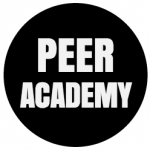 The last few years have seen learning take on an unquestionably more social air to it. Whether it’s MOOCs bringing higher education to the masses or a raft of new social games, there are a whole host of new ways for people to learn online, and to do so in a more social way. Kind of anyway. Of course, when you get thousands of learners together and provide them with social tools, it’s inevitable that a degree of tacit learning will take place. The core focus of MOOCs remain however of the chalk and talk variety. Lectures are uploaded to be consumed by learners.
The last few years have seen learning take on an unquestionably more social air to it. Whether it’s MOOCs bringing higher education to the masses or a raft of new social games, there are a whole host of new ways for people to learn online, and to do so in a more social way. Kind of anyway. Of course, when you get thousands of learners together and provide them with social tools, it’s inevitable that a degree of tacit learning will take place. The core focus of MOOCs remain however of the chalk and talk variety. Lectures are uploaded to be consumed by learners.
Peer Academy want to take a leaf out of the sharing economy and make learning much more peer-to-peer, and they want to do so around the prickly topic of change management.
The goal of the Australian project is to bring people together from government, non-profit, and the corporate sectors who want to accelerate change in their own organizations. The Peer Academy want to provide a platform for those people to increase their capacity and capabilities for change through the sharing of knowledge, skills and tools.
The project was born out of a belief that traditional educational approaches are not swift enough to keep pace with the rapidly changing world we live in. Therefore, they believed that the best way to learn would be from one another. That those who have been through what we’ve been through would be the best teacher we could hope for.
Whereas MOOCs offer a degree of scale by hosting their sessions online, Peer Academy have gone down a very different route. They host a number of sessions in a physical location, with participants expected to come along, bring a notepad and pen with them, and participate in the learning as much as they consume it.
The project is currently in beta mode, but current sessions include collaborative governance, storytelling for change and creating change in your organization.
In addition to attending a session, individuals or teams can also host sessions of their own, and Peer Academy provide guidance on how to go about doing this.
Suffice to say, as an early stage Australian project, all of the sessions thus far are in Melbourne. It’s unclear at this stage if the team plan on expanding overseas, but the model seems relatively straightforward so I’m sure it will travel if it proves successful.
Whilst the scale of impact achieved by this is unlikely to come close to that achieved by the MOOCs, it may nonetheless prove a useful, grassroots initiative in supporting something that is historically so difficult to achieve. In that sense, it will very much be a project worth following.
Interesting concept. It seems quite low key and small scale though. Can it scale up?